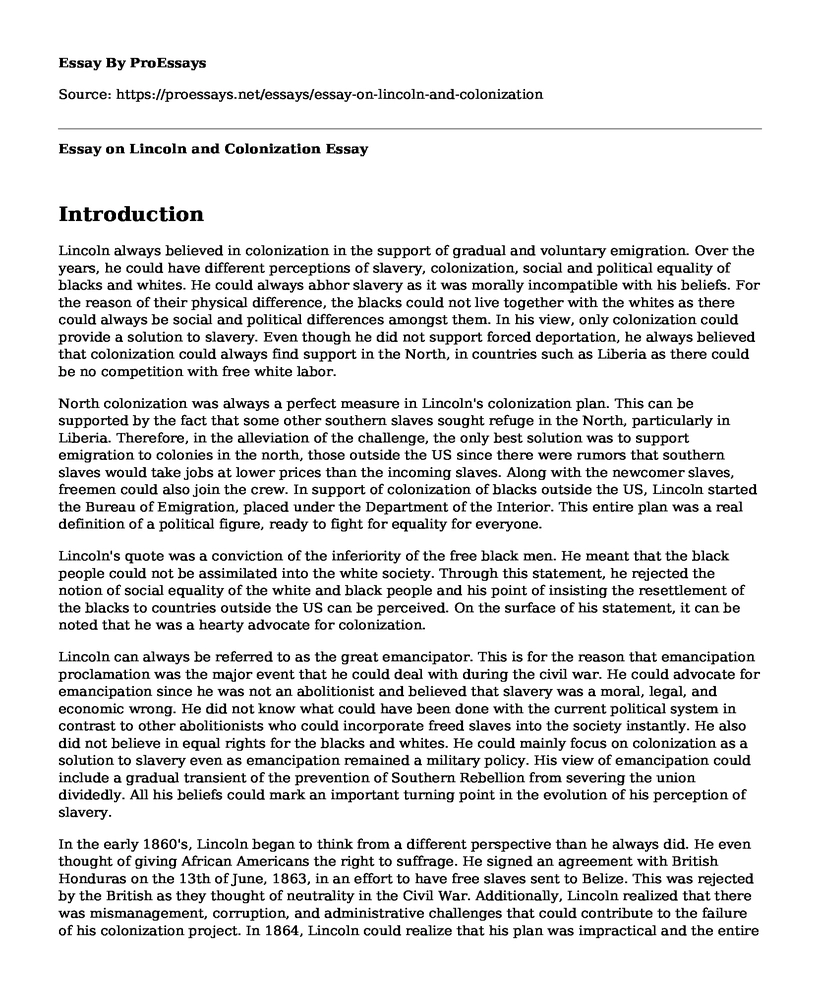Introduction
Lincoln always believed in colonization in the support of gradual and voluntary emigration. Over the years, he could have different perceptions of slavery, colonization, social and political equality of blacks and whites. He could always abhor slavery as it was morally incompatible with his beliefs. For the reason of their physical difference, the blacks could not live together with the whites as there could always be social and political differences amongst them. In his view, only colonization could provide a solution to slavery. Even though he did not support forced deportation, he always believed that colonization could always find support in the North, in countries such as Liberia as there could be no competition with free white labor.
North colonization was always a perfect measure in Lincoln's colonization plan. This can be supported by the fact that some other southern slaves sought refuge in the North, particularly in Liberia. Therefore, in the alleviation of the challenge, the only best solution was to support emigration to colonies in the north, those outside the US since there were rumors that southern slaves would take jobs at lower prices than the incoming slaves. Along with the newcomer slaves, freemen could also join the crew. In support of colonization of blacks outside the US, Lincoln started the Bureau of Emigration, placed under the Department of the Interior. This entire plan was a real definition of a political figure, ready to fight for equality for everyone.
Lincoln's quote was a conviction of the inferiority of the free black men. He meant that the black people could not be assimilated into the white society. Through this statement, he rejected the notion of social equality of the white and black people and his point of insisting the resettlement of the blacks to countries outside the US can be perceived. On the surface of his statement, it can be noted that he was a hearty advocate for colonization.
Lincoln can always be referred to as the great emancipator. This is for the reason that emancipation proclamation was the major event that he could deal with during the civil war. He could advocate for emancipation since he was not an abolitionist and believed that slavery was a moral, legal, and economic wrong. He did not know what could have been done with the current political system in contrast to other abolitionists who could incorporate freed slaves into the society instantly. He also did not believe in equal rights for the blacks and whites. He could mainly focus on colonization as a solution to slavery even as emancipation remained a military policy. His view of emancipation could include a gradual transient of the prevention of Southern Rebellion from severing the union dividedly. All his beliefs could mark an important turning point in the evolution of his perception of slavery.
In the early 1860's, Lincoln began to think from a different perspective than he always did. He even thought of giving African Americans the right to suffrage. He signed an agreement with British Honduras on the 13th of June, 1863, in an effort to have free slaves sent to Belize. This was rejected by the British as they thought of neutrality in the Civil War. Additionally, Lincoln realized that there was mismanagement, corruption, and administrative challenges that could contribute to the failure of his colonization project. In 1864, Lincoln could realize that his plan was impractical and the entire country could only gain from having slaves join the Union forces. He could be insisted by other African Americans from the US Army and the Navy that they were willing to fight for their own freedom and that of the Union as soon as they were advised to do so. Additionally, he changed his plans since he realized that freedmen did not see Africa as their homeland since it was in America that they were born and raised. His change of views was made public at the end of the Civil War and just before his assassination.
Cite this page
Essay on Lincoln and Colonization. (2022, Jun 22). Retrieved from https://proessays.net/essays/essay-on-lincoln-and-colonization
If you are the original author of this essay and no longer wish to have it published on the ProEssays website, please click below to request its removal:
- Essay Sample on Reforms Needed in the Policing Institution
- Changing the Texas Constitution Essay Example
- Intelligence-Led Policing: Leveraging Tech for Risk Assessment & Crime Prevention - Essay Sample
- Essay Example on Love is Essential in Greek Culture - Benefits & Impact
- Essay Example on Our Blindness: Failing to See the Signs of Our Times
- The 18th Century Industrial Revolution: A Tale of Management Milestones - Essay Sample
- Essay Sample on The Rise and Growth of Slavery: Its Impact on Africa







